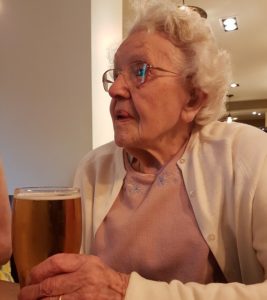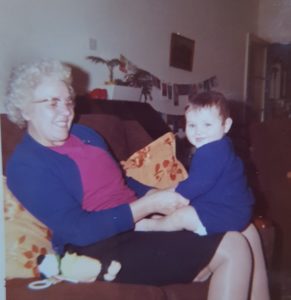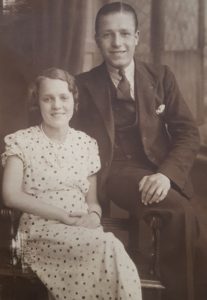It’s been a long, long time/Since I’ve memorized your face
It’s been four hours now/Since I’ve wandered through your place
And when I sleep on your couch/I feel very safe
And when you bring the blankets/I cover up my face
I do love you/I do love you
Sufjan Stevens. Futile Devices.
Elsie May Hawes, née Somerfield
b. 23 November 1917
d. 29 April 2020

I will miss travelling the hour down the A5 to help care for my Nan, Elsie Hawes, in the same house she had moved into after she married my Grandad, Ken, in 1940. It was the house where I had lived until my Mom remarried in 1973. It was the house that always felt like a safe haven. It was the house where she had lived alone following Ken’s passing in 1990. It was the house where she kept on.
She broke her hip in September 2018. For what seemed like forever, although it was six weeks, I would travel across to the hospital in Walsall, to discover her breaking the hearts of the nursing staff, declaring them angels sent from heaven. When she moved back home, the care team were also treated as angels by her. Almost everyone who came into contact with her wanted to take her home and adopt her, because when she saw you her face lit up unconditionally and made you the centre of attention. And she helped you recognise that the meaning and reality of care are mutual creations.
“She was 102 and we can confirm the happiest person, we as a team, had the pleasure of working with”
“Elsie you were amazing. I always look forward to visiting you and spending time I was there to cheer you up but I always went away feeling that you had made me happy.”
“Elsie was always so pleasant and grateful for everything. An amazing lady and such a pleasure to be with. I’m a better person for knowing her.”
Tributes from Hayward Befriending
Elsie and Ken cared for me having removed me and my Mom from the police house in which we were living in late 1971. They demonstrated immense strength as a working-class couple, in standing up to authority, in the name of their family and what they felt was right and just. It was in these next months at the start of my life that the connection was born, which would carry me through to helping my aunt, uncle and cousin to care for Elsie at the end of hers.

I have always held this care at the start of my life close to my heart. And I always felt taken-in to her heart. Yet not only was it important for me to reciprocate and reproduce and renew her love and care towards the end, but I also felt the need to make amends because I had not seen her for six years around the time Ken passed away. Our relationship was honest enough that we could talk about this, and that she could tell me he died with a broken heart, and that we could still hold hands, and I could still feel loved unconditionally. It was strong enough that we could talk about my birth father and my history, and she could express her fears that she would lose me, and I could comfort her. Because this was the only relationship in which I have ever really felt loved unconditionally; never scared of being abandoned; never scared of the scar of abandonment opening up again; never sitting in life’s antechamber.
Travelling over to see her in hospital was exhausting but necessary. I learned this six years earlier in doing the same for my Mom before she passed away. There is love and tenderness that needs to be shown in the hospital, but there are also questions that need to be asked and care plans discussed and contingencies negotiated. Periodically, as Elsie struggled with bouts of pneumonia, or when her SATs dropped as congenital heart failure and dementia kicked-in, we would find ourselves back chasing ambulances to A&E, and waiting. And after fears that this would be it, we would find her laughing with nurses and wolfing pieces of toast and butter. Rediscovering her in this way made these visits necessary.
We used to pop over on Tuesdays and Saturdays, since she broke her hip in September 2018. It was here that new sides to her were revealed to me, and new stories were told. Perhaps one of her strongest memories was of her friend Elsie Booker collecting her from her home in Leamore to walk to school. My great-grandmother would see two boys waiting at the top of the road and ask: what do they want? My Nan would reply that it was Elsie Booker’s brother and his friend Ken, and they were just going to walk to school together. My Nan loved the conspiratorial nature of this story, compounded by the fact that they did not take the sensible route to school, rather they walked across the park attempting to jump the brook without getting their feet wet, and if they failed then they had to avoid anyone in authority knowing they had wet shoes.
This is important because my Nan had a strong sense of self. But she also had a strong sense of duty and loyalty. I carry this fierce loyalty, and I hope some of her courage and faith. From an early age she would arise to do housework, including lighting the fire so that her father, a miner who worked nights on Cannock Chase, would have hot water when he came in. She used to complain, as the third eldest of seven sisters, of having to get up to do housework and then go to school, and after school having to take cleaning jobs, and that she was the carthorse because her sisters did not have the same pressures. Yet, almost immediately she would talk of how she loved doing chores in the kitchen with the back door open so she could hear her father singing as he dug potatoes.
Are you ever burdened/With a load of care?
Does the cross seem heavy/You are called to bear?
Count your many blessings/Ev’ry doubt will fly
And you will keep singing as the days go by
John Oatman. Count Your Blessings. Hymnal.
In telling us the stories, I realised just how much life had been layered around her. She was born during the First World War, and had an uncle killed as a stretcher bearer at Passchendaele. She had left school at 14 to take up work in the glove trade in Walsall. After her housework, she would cycle 3 miles to the factory, put in a full day, and cycle home to do some more housework. Yet, her face lights up as she tells of occasional evening knockabouts playing tennis in the park with her sister Betty. To the end she claimed that her old tennis racket was in the cubbyhole in her bedroom. We smiled.
She was born into an age without mass transportation or communication, just ahead of the flu pandemic of 1918. She witnessed the great depression and the Second World War, the rise of the welfare state and consumerism. When we speak about the speedup of life it makes me smile, given the historical, material and cultural changes my Nan witnessed. Of course, these changes were threaded into an ordinary life, anchored very much in a few square miles of The Black Country, and in family and friends.
Ken was the love of her life, and we hope that she can be buried with him in the next few weeks. She married him in 1940, after a decade of courtship, and there is an amazing postcard of a photograph that they had taken at the Horace Dudley studio in Walsall in 1935, where he has written “Pals” and she has written “SWEETHEARTS” on the reverse. To her, they were more than pals; she was always determined. There are photos of her with her father in his garden, with her parents and sisters in the backyard on her sister Linda’s wedding day, with her mother and aunts and sisters on a day out in the 1930s. Yet I am drawn to the photos of Ken and Elsie’s wedding in Bloxwich, precisely because all these strands of my back story are visible and collected. I can never recover them, but at least they are collected.

Later in her life, she tells a story of meeting Queen Mary, the Queen Mother, in a hospital near Brixham where she was visiting Ken following an injury on manoeuvres. After he was demobilised, they moved into a British Waterways property, the 2-up 2-down in which they cared for my Mom and Aunt, and then me, where they welcomed my sister and cousins, and then in which she cared for my Grandad as he passed with cancer. She ended up having the shortest commute possible, as she became the forewoman for a men’s clothing factory across the road from her house. Beyond retirement, her expertise and availability was such that she kept being called in for advice – it was how Shankley would have wanted it at Liverpool.
It is indicative of how people felt about her that she had deep and lasting contact with those she had apprenticed and mentored. Family members of women she had worked with in the 1930s were still in her life. She continued to get the park-and-ride bus to two clubs, and was proud that as the elder stateswoman she had the best seat at the Thursday club. She was especially close to her sister Linda, with whom she went on weekly outings around the West Midlands on bus and train: Dudley one week; West Bromwich the next; Wolverhampton Civic theatre for the pantomime. Then they would go on coach holidays, until Linda’s health worsened. I remember them laughing, getting off the train in Leicester for a visit, when they were both in their late 80s. I remember how she made everyone feel that they mattered at her 100th birthday party. I remember how she treasured the wrist warmers that Jo crocheted for her, and how she sat holding Jo’s hands as friends. Apparently small pleasures treasured, and life lived for the present with hope for the future.
It took me a long time to understand this. Caring for Elsie taught me to recognise my sometimes pointless relationship to nostalgia. It was my grandad who first took me to watch Walsall FC play. He had watched them for years and the ritual around the game that he and Elsie put in-place became seminal in my life. It’s why, in spite of my team’s mediocrity, they are in my soul. Rediscovering footage from that 1979/80 season centres me at the intersection of critically and psychologically important elements of my history. Moreover, it reveals characteristics of my identity, in the psychological surety and safety of certain places and people. It reveals to me how that surety and safety was damaged, and how I spent my life trying to recover them until I realised how pointless it was, constantly looking backwards towards the fissures and breaks.
Instead, I try to focus upon small pleasures to be treasured. Saturday lunchtimes of egg and chips (very brown chips), and bags of cola cubes, and arriving home after the game to Saturday evenings of ham and cheese salad with pickles. Lots of pickles. (Especially her famous home-made picked onions. In her final pickling year when she was 90-odd, she made 91 pounds in weight, carrying them all back on the bus from Walsall.) I remember (deliberately?) falling asleep on Saturday evenings at their house, and staying over. I loved waking up there, and feeling like I belonged. I remember playing in the street in the summer of 1976 and my grandparents arriving to visit us, and the world lit-up.
It was this light that my Nan continued to bring in to the end. As we discovered her love of singing, and as she took such joy in the everyday whilst she was confined to her bed or hoisted into her chair. Her cheeky grin at the thought of some splosh (generally whiskey and cream) in her coffee, or laughing as we discussed whether Walsall had lost again, but cherishing the colours of the flowers she was bought, or watching the birds through her window. And then, “I won’t always be like this”, she would say, before breaking out into song: “I like a nice cup of tea in the morning/I like a nice cup of tea with my tea/and when I go to bed, there’s a lot to be said, for a nice cup of tea.”
I like to think that she went out as she lived her life, on her own terms as much as was humanly possible. It grieves me that I could not see her for the last six weeks of her life, other than in WhatsApp video calls with my aunt. But I love that she recognised us, and that she knew us from the card Jo made for her. I love that in a time of corona-crisis, she did not succumb, and instead it was just her time. We joked that she was never ill, and that everyone needed a couple of vials of her blood. We remember that she consistently defied the odds in life, and after she broke her hip, to keep on. I am forever grateful that my aunt was there with her at the end.
This is amazing to me as I reflect upon how much loss she must have grieved or endured, processed and internalised, and moved through, in her 102 years. There was a focus upon the ritual of the everyday, and of accepting the need to open yourself out to life. There is a calmness and simplicity in this. Not a stoicism or naïveté. Rather she demonstrated an acceptance of life, and of being able to sit with all its forms.
I think she would have loved the playlist of songs suggested by so many of my friends.

What this time with her has given me, in her long walk into the light, is a renewed understanding of myself and what is possible in my life and what is possible from my life. Our relationship has helped me renew my relationship with my family and especially my aunt, uncle and cousin, whose love and care for Elsie over the years is a celebration and to be celebrated. I have learnt some humility in this, and to try to balance my past with my present. I have also learnt to hold the everyday as central, whilst trying to do the right thing.
Elsie taught us to believe that we are courageous, and that in having faith in ourselves and each other we might find a more just way of living. Hers was a hopeful life, and one that pointed me towards peace. Her life is a reason why I dedicated my last book to her: “She taught me the value of conditionality and how to live with dignity. She taught me that a good-enough life could be described as ‘fair-to-middling ’”. Fair-to-middling was how she would reply when you asked her how she was, before she laughed. It was a beautiful understatement; like her life.
Her love is safe with me.
This is not the sound of a new man/Or a crispy realization
It’s the sound of me unlocking and you lift away
Your love will be/Safe with me
Bon Iver. Re:stacks.




